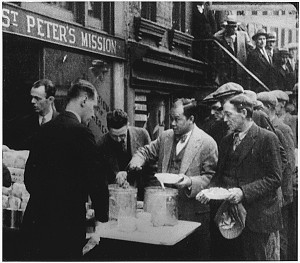
The “economic experts” in Congress, the White House, and the bureaucracy have been rushing hither and yon with inconsistent and incoherent policies, hugely differing estimates of the amount of the “stimulus” (aka inflationary money creation) they are proposing, etc., etc., etc. And — surprise! — people don’t like to invest in such an environment. Here are some updates on the results of the wave of policy uncertainty generated by our self-styled saviors:
New York Times: “Growing Worry on Rescue Takes a Toll on Banks”
The decline, which had been building for days, underscored the growing anxiety on Wall Street about what the government would do next. The Obama administration has provided few details about its plans to shore up troubled lenders, sowing confusion in the markets and inside the banks about its intentions.
Wall Street Journal: “U.S. Seeks to Stem Bank Fears”
The broad declines show that investors are struggling to sort out the impact of the government’s moves already to expand its role in the banking system. Those steps include owning preferred stakes that now exceed the value of all the privately held common shares in some banks. Federal officials are weighing whether to change their ownership into securities that could be converted to common stock, essentially giving the government control of some of the nation’s largest financial institutions.
Just a little more of that, guys, plus endless “stimulus” to keep the economy from adjusting to the realities revealed by the crash of a pyramid of paper, AND more protectionism like the Smoot-Hawley Tariff of 1930….and you can make this awful downturn into another Great Depression. The sad thing is that you’ll then get credit for “ending it” sixteen years later.










16 years later? How about 60 years later?
Seriously, though, at times like this I wonder to what degree we can rely on the “wisdom of the crowds.” Do nonsensical government actors undermine the ability of the crowd (in this case the market) to have any predictive ability?
Thanks for these.
Academically, I think there is a much better understanding of the benefits of free trade now than there was in 1929. I’m hopeful we won’t have another Smoot-Hawley catastrophe, despite some rhetoric to the contrary.
That said, it does seem like Washington is determined to dig us deeper into the hole.
[…] the third term of the Bobama Administration began. But no one will blame it on the intervention (well, I do, at least partially). The failures of the intervention are reason enough for…..more intervention! If the drug […]